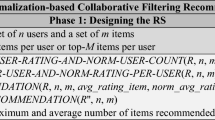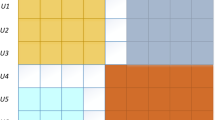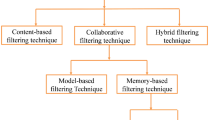Abstract
With the advent of the Internet, the types and amount of information one can access have increased dramatically. In today’s overwhelming information environment, recommendation systems that quickly analyze large amounts of available information and help users find items of interest are increasingly needed. This paper proposes an improvement of an existing preference prediction algorithm to increase the accuracy of recommendation systems. In a recommendation system, prediction of items preferred by users is based on their ratings. However, individual users with the same degree of satisfaction to an item may give different ratings to the item. We intend to make more precise preference prediction by perceiving differences in users’ rating dispositions. The proposed method consists of two processes of perceiving users’ rating dispositions with clustering and of performing rating normalization according to such rating dispositions. The experimental results show that our method yields higher performance than ordinary collaborative filtering approach.










Similar content being viewed by others
References
Celma S Music recommendation and discovery. Springer-Verlag
Clauset A, Shalizi C, Newman M (2009) Power-law distributions in empirical data. SIAM Rev 51:661–703
Golder S, Huberman B (2006) The structure of collaborative tagging systems. J Inf Sci 32:198–208
Kim S, Park C, Kim S (2012) A hybrid recommendation system using trust scores in a social network. International conference on embedded and multimedia computing. Lect Notes Electr Eng 181:107–112
Koren Y, Bell R, Volinsky C (2009) Matrix factorization techniques for recommender systems. Computer 42:30–37
Krause B, Schmitz C, Hotho A, Stumme G (2008) The anti-social tagger—detecting spam in social bookmarking systems. Proc. on AIRWeb. pp 61–68
Lekakos G, Giaglis G (2006) Improving the prediction accuracy of recommendation algorithms: approaches anchored on human factors. Interact Comput 18:410–431
Lipman DJ, Pearson WR (1985) Rapid and sensitive protein similarity searches. Science 227:1435–144
Manning C, Raghavan P, Schute H (2008) Introduction to information retrieval. Cambridge University Press, Cambridge
Markines B, Cattuto C, Menczer F (2009) Social spam detection. Proc. on AIRWeb
Massa P, Avesani P (2004) Trust-aware collaborative filtering for recommender systems. On the Move to Meaningful Internet Systems 3290:492–508
Melville P, Nagarajan R (2002) Content-boosted collaborative filtering for improved recommendations. Proc. on The Eighteenth National Conference on Artificial Intelligence. pp 187–192
Papagelis M et al (2005) Alleviating the sparsity problem of collaborative filtering using trust inferences. Trust Manag 3477:224–239
Resnick P, Iacovou N, Suchak M (1994) Grouplens: An open architecture for collaborative filtering of netnews. Proc. on Computer Supported Cooperative Work. pp 175–186
Resnick P, Varian H (1997) Recommender systems. Commun ACM 40:56–58
Rho S, Hwang E, Park J (2011) M-MUSICS: an intelligent mobile music retrieval system. Multimed Syst J 17(4):313–326
Rho S, Song S, Nam Y, Hwang E, Kim M (2013) Implementing situation-aware and user-adaptive music recommendation service in semantic web environment. Multimed Tools Appl 65(2):259–282
Shepitsen A et al (2008) Personalized recommendation in social tagging systems using hierarchical clustering. Proc. on ACM conference on Recommender systems. pp 259–266
Wu L, Yang L, Yu N, Hua X (2009) Learning to tag. Proc. on WWW. pp 361–370
Author information
Authors and Affiliations
Corresponding author
Additional information
This research was supported by the Chung-Ang University Research Scholarship Grant in 2011.
Rights and permissions
About this article
Cite this article
Kim, SC., Sung, KJ., Park, CS. et al. Improvement of collaborative filtering using rating normalization. Multimed Tools Appl 75, 4957–4968 (2016). https://doi.org/10.1007/s11042-013-1814-0
Published:
Issue Date:
DOI: https://doi.org/10.1007/s11042-013-1814-0




